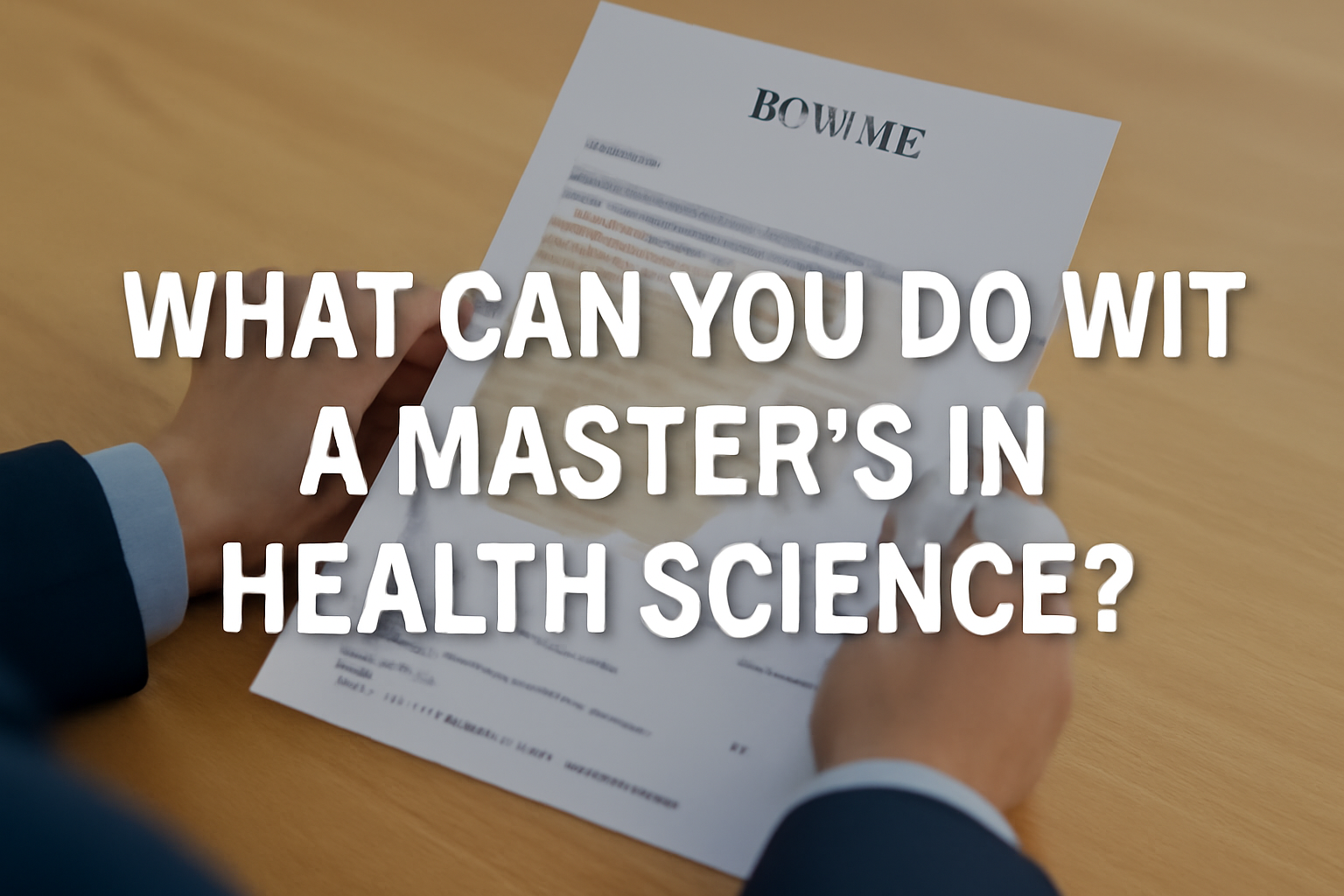A Master’s in Health Science opens up numerous career opportunities. The healthcare field continues to evolve, and advanced education in this area is key to staying at the forefront. If you’re wondering what can you do with a master’s in health science, this article will guide you through various career paths and how this degree can shape your professional future.
Table of Contents
Public Health Leadership
One of the most sought-after roles for graduates is leadership within public health. Public health leaders manage and design programs that aim to improve health on a community or national level. You might oversee disease prevention programs or health education campaigns. These positions demand strong organizational skills, as you’ll handle everything from policy development to program implementation. If you’re passionate about making an impact on a large scale, a career in public health leadership may be right for you.
In this field, you may work for government organizations, non-profits, or international health agencies. Roles like Public Health Administrator, Health Program Director, and Epidemiologist are common. These jobs offer opportunities to influence health outcomes directly and improve the well-being of entire populations.
Health Education and Promotion
You can also focus on health education and promotion. This role involves educating communities on health risks and healthy living practices. You might develop programs that promote exercise, nutrition, or mental health awareness. Health educators work in schools, clinics, and workplaces, guiding people toward healthier choices. You could lead wellness programs or health campaigns aimed at tackling smoking, obesity, or substance abuse.
Health promotion roles require communication skills and the ability to connect with diverse populations. As a Health Educator or Community Health Specialist, you’ll not only share knowledge but also inspire others to live healthier lives. A master’s degree in health science equips you with the tools to design and implement these programs effectively.
Healthcare Management and Administration
What can you do with a master’s in health science in healthcare management? You can manage the operations of healthcare facilities. As a healthcare administrator, you might oversee a hospital, clinic, or even an entire health system. Your duties will include managing staff, ensuring compliance with regulations, and maintaining budgets. You’ll need strong leadership and decision-making abilities to run efficient operations.
Healthcare management positions such as Health Services Manager, Healthcare Consultant, and Medical Services Manager are popular. These jobs offer significant responsibility and the opportunity to influence healthcare delivery and policy within facilities.
Research and Data Analysis
If you are interested in healthcare research, a Master’s in Health Science offers a great foundation. You may find yourself analyzing trends, studying disease outbreaks, or assessing health interventions. Research roles allow you to focus on gathering data and drawing conclusions that can help improve public health policies or healthcare practices.
Health researchers often work for universities, research institutions, or pharmaceutical companies. As a Clinical Research Coordinator or Biostatistician, you could conduct studies on disease treatments or investigate health patterns. This career allows you to make discoveries that benefit communities globally.
Healthcare Policy and Advocacy
Another pathway is working in healthcare policy. Professionals in this field help shape the laws and regulations that govern health services. You might work for a government agency, a healthcare provider, or a non-profit, analyzing policies and advocating for changes that improve healthcare delivery.
Policy analysts and health advocates focus on issues like insurance coverage, access to care, and healthcare costs. If you are passionate about making systemic changes in healthcare, pursuing a role in policy and advocacy could be a fulfilling career choice.
Clinical and Patient Care Roles
A Master’s in Health Science can also enhance your clinical career. While this degree is not a clinical certification, it can pave the way for roles in patient care coordination. You could work as a Physician’s Assistant, Nurse Practitioner, or Clinical Coordinator, supporting patient care and working directly with healthcare teams.
These positions often require additional clinical training or certification, but a health science master’s degree provides the knowledge you need to manage patient care effectively. If you want to combine your healthcare knowledge with direct interaction with patients, this could be the right path for you.
Global Health Opportunities
If global health challenges interest you, a Master’s in Health Science can lead to international career opportunities. Professionals in global health work to tackle health issues that affect populations in low-resource countries. You may focus on infectious disease prevention, maternal health, or access to healthcare.
In global health roles, you might work with international organizations like the World Health Organization (WHO) or NGOs. These positions require cultural sensitivity and the ability to work in diverse settings. If you are motivated to address healthcare inequalities worldwide, a career in global health could offer meaningful experiences.
Health Informatics and Technology
Health informatics is another rapidly growing field. Professionals in this area combine healthcare knowledge with technology to improve how health data is managed. You may work on developing or managing electronic health records (EHRs) or other healthcare technologies.
Roles such as Health Informatics Specialist or Health Data Analyst are in high demand. These positions require both healthcare expertise and technical knowledge, making them perfect for someone interested in merging the worlds of healthcare and technology.
Teaching and Academia
If you enjoy teaching, a Master’s in Health Science can open doors to academia. You might become a professor, lecturer, or trainer in public health programs. Professors in health science teach courses related to healthcare administration, policy, or public health and mentor future healthcare professionals.
Academia offers a unique opportunity to shape the next generation of healthcare leaders. If you are passionate about education and research, pursuing a teaching career could be a rewarding choice.
Environmental Health and Safety
Environmental health professionals focus on the intersection of the environment and public health. This field involves managing environmental risks such as air pollution, waste disposal, and hazardous materials. Professionals in environmental health work to ensure that communities remain safe from environmental hazards that could negatively impact public health.
As an Environmental Health Specialist or Safety Officer, you would address issues like contamination, safety regulations, and environmental health education. This field combines public health with environmental science, providing a dynamic career path.
Conclusion: Maximizing the Potential of a Master’s in Health Science
What can you do with a master’s in health science? The opportunities are vast and diverse. Whether you aim to work in healthcare management, public health, education, or research, this degree equips you with the tools to make a significant impact. A Master’s in Health Science provides not only the specialized knowledge needed to advance in your career but also the flexibility to explore various roles within the healthcare field.
No matter your specific interest, this degree offers the chance to influence health outcomes, lead teams, or contribute to policy changes. If you’re looking to take your healthcare career to the next level, a Master’s in Health Science could be the perfect next step.






